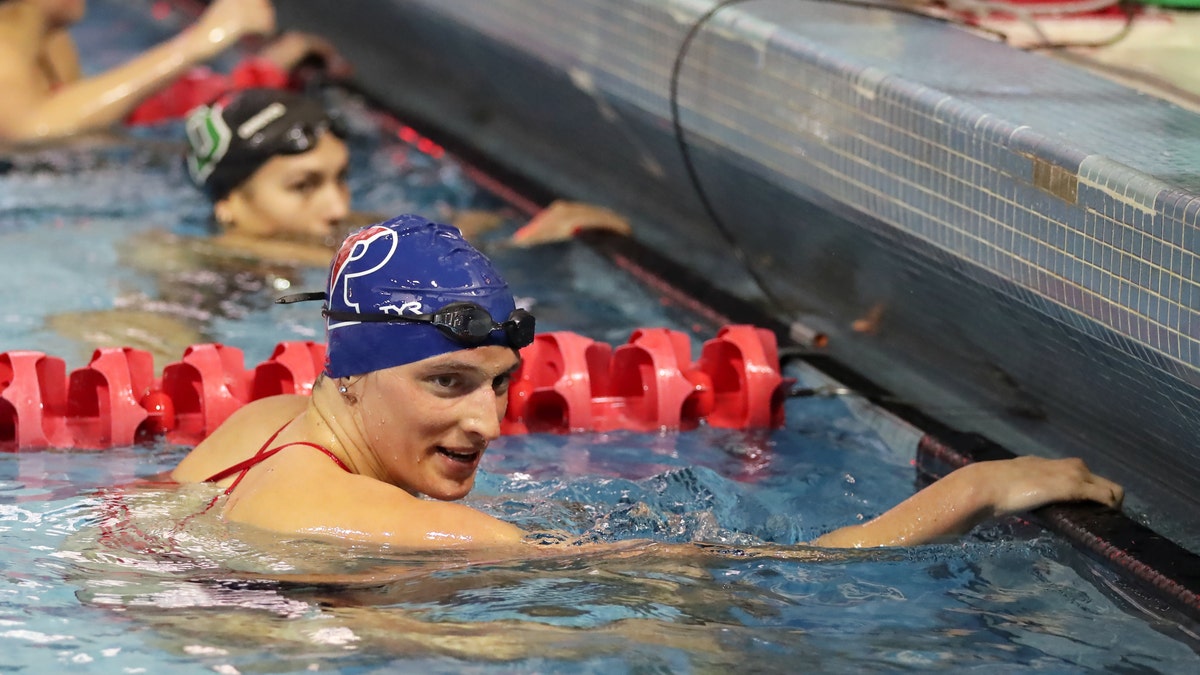Clay Travis: Ivy League female swimmers ‘terrified’ to come out against trans swimmer Lia Thomas
The OutKick founder reacts to a report about Lia Thomas’ teammates feeling ‘ignored’ and applauds Aaron Rodgers’ critique of the NFL’s vaccine policy.
The National Collegiate Athletic Association (NCAA) has yet to weigh in on mounting criticism over its transgender athlete policy that critics argue threaten the future of women's sports.
The Ivy League and University of Pennsylvania both released statements last week defending transgender athlete Lia Thomas, who has been shattering records in women’s swimming ever since she was allowed to switch from the men’s team to the women’s team under NCAA rules, which state that a trans woman must undergo testosterone suppression treatment for a year before competing as a woman. The Penn student has been receiving the treatment for over two years.
PENN SWIMMER LATEST EXAMPLE OF TRAN ATHLETE DOMINATING FEMALE SPORTS

Lia Thomas of the Pennsylvania Quakers after winning the 500 meter freestyle event during a tri-meet against the Yale Bulldogs and the Dartmouth Big Green at Sheerr Pool on the campus of the University of Pennsylvania on Jan. 8, 2022 in Philadelphia, Pennsylvania. (Hunter Martin/Getty Images)
Thomas dominated the 500-yard freestyle preliminaries and finals at the Zippy Invitational at the University of Akron last month and set new national and school records in the 1,650-yard, 500-yard and 200-yard freestyle competitions. On Saturday, she won the 200-yard and 500-yard freestyle and finished in fifth place in the 100-yard freestyle during the school’s tri-meet with Yale and Dartmouth.
Several Ivy League swimming parents who spoke with Fox News Digital are calling on the NCAA to change its policy to be more fair to biological women.
"It starts with the NCAA," two parents of a Penn swimmer on the women's team told Fox News. "I think the NCAA needs to change its policies, and find a way to include transgender women without trampling all over biological women," the parents said.
Another Penn swimming parent, Sue Feldman, said: "I think that this is obviously an issue and they should probably just look at how they're going to handle it and maybe handle it better in the future because right now they're not handling it so well."
"I feel like she followed all the rules that she's supposed to follow," Feldman said of Thomas, adding that she "empathizes with the other girls that are playing against her."

Lia Thomas of the Pennsylvania Quakers gets ready to compete on Jan. 8, 2022 in Philadelphia, Pennsylvania. (Hunter Martin/Getty Images)
The Ivy League released a statement Thursday supporting Thomas’ participation on the women’s team, saying she and the school had "worked with the NCAA to follow all of the appropriate protocols in order to comply with the NCAA policy on transgender athlete participation and compete on the Penn women’s swimming and diving team."
"The Ivy League has adopted and applies the same NCAA policy," it said. "The Ivy League reaffirms its unwavering commitment to providing an inclusive environment for all student-athletes while condemning transphobia and discrimination in any form. The league welcomes her participation in the sport of women’s swimming and diving and looks forward to celebrating the success of all of our student-athletes throughout the season."
Penn also issued a statement saying Thomas had "met or exceeded all NCAA protocols over the past two years for a transgender female student-athlete to compete for a women’s team."
"She will continue to represent the Penn women’s swimming team in competition this season," it said.
Unlike Penn and the Ivy League, the NCAA has not defended Thomas or its policy in light of the controversy.
The organization did not respond to Fox News Digital’s multiple requests for comment.

Lia Thomas of the Pennsylvania Quakers smiles after winning the 200 meter freestyle event on the campus of the University of Pennsylvania on Jan. 8, 2022. (Hunter Martin/Getty Images)
Critics of the NCAA’s policy, like Swimming World magazine editor-in-chief John Lohn, argue that Thomas has an advantage over her biological female competitors that is similar to doping.
"The effects of being born a biological male, as they relate to the sport of swimming, offer Thomas a clear-cut edge over the biological females against whom she is competing," Lohn wrote last month. "She is stronger. It is that simple. And this strength is beneficial to her stroke, on turns and to her endurance. Doping has the same effect."
"The NCAA’s one-year suppressant requirement is not nearly stringent enough to create a level playing field between Thomas and the biological females against whom she is racing," he wrote.
Other critics, like Nancy Hogshead-Makar, chief executive of women’s sports advocacy group Champion Women, suggest that there might be enough transgender athletes in some sports to allow for a category just for trans competitors.
CLICK HERE TO GET THE FOX NEWS APP
"This topic is very uncomfortable for people. They don’t understand it, and so they took the lazy way out," Hogshead-Makar, who won four swimming medals at the 1984 Los Angeles Olympics, told The Washington Post. "The lazy way out is saying, ‘Put them in the women’s category.’
"To blow up the women’s category is just not the answer. This makes the women’s category meaningless," she said.
Fox News’ Lisa Bennatan contributed to this report.





